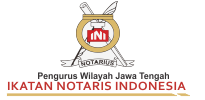The Comparison of Adopted-Children and Biological-Children in Inheritance According to “Mbaham†Tribe The Customary Law and Islamic Law of as Well as The Role of The Notary in The Making of Inheritance Agreement
Abstract
The legal system or the rules of “Mbaham†tribe customs in Fak-Fak town Papua and Islamic legal system headed for the adopted-children and biological children about the inheritance can be compared, because both of these rules can be different systems and can also be the same, especially in determining the rights of each child's portion. It also refers to a notary whose position has specific tasks to do the agreement of inheritance when the heirs want the services of a notary. The main problems of the research as follows; one, how the comparison of the adopted-children's and the biological children’s rights in inheritance according to “Mbaham†tribe customary law and Islamic law as well as the role of the public notary in the creation of the certificate. Second, what is the equality of the rights of biological  children and adopted-children in the inheritance according to the customary law of Mbahan tribe and Islamic law. Third, what is the difference of the rights of biological children and adopted children in the inheritance according to the customary law of “Mbaham†tribe and Islamic law. This research used a juridic empirical approach, with the specification research of descriptive analysis. The type and source of data which were used, namely primary and secondary data and the techniques of data gathering was the primary, secondary, and tertiary data. This research also used qualitative analysis to analyze the data. The results of this research showed that, Islamically the system was Individual, where the inheritance became the property of the class who has been defined in the provisions of Islamic law based on bilateral kinship. Being in the customs of “Mbaham†tribe was not necessarily because it could accept Islamic law as the guideline, but sometimes, it differed in accordance with custom. For the role of the public notary can be used in the manufacture of the agreement of inheritance when the heirs want to disburse the funds stored in the bank. The consequences of the law which was happened headed for the adopted-children and biological children was both still get each inheritance, but all were depended on the provisions within the follow, whether the customary law or Islamic law. The notary could give advice and help the beneficiary in the making of inheritance agreement.
Keywords: Comparison; Inheritance; Notary
Full Text:
PDFDOI: http://dx.doi.org/10.30659/akta.v5i3.3171
Refbacks
- There are currently no refbacks.
Copyright (c) 2018 Jurnal Akta

This work is licensed under a Creative Commons Attribution-NonCommercial-NoDerivatives 4.0 International License.
Jurnal Akta has been indexed by:
Editorial Office: Jurnal Akta Room 2nd Floor Imam As Syafei Building Faculty of Law Universitas Islam Sultan Agung. Jln. Kaligawe KM. 4, Semarang City, Central Java, Indonesia. Phone +62 24 6583584 Fax +62 24 6582455
Email: jurnalakta@unissula.ac.id

![download[4]](https://jurnal.stiki-indonesia.ac.id/public/site/images/adminjurnal/template_jurnal_tosca1.png)














